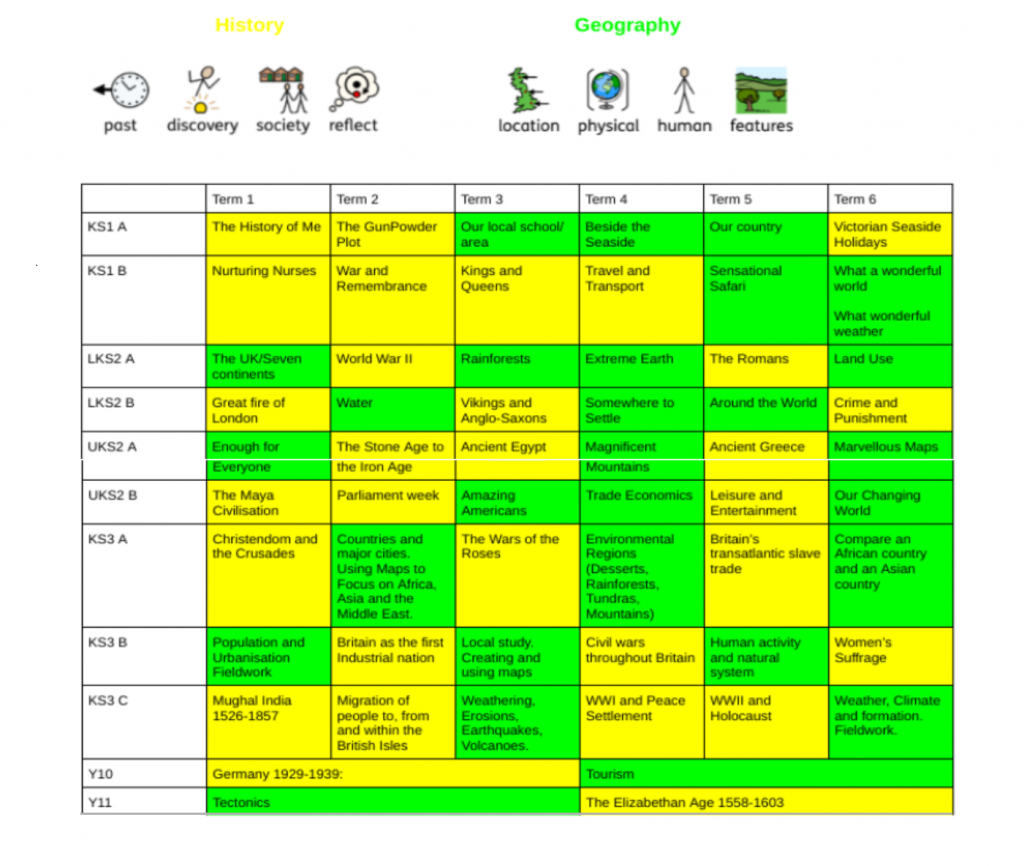History
Intent
At Westhaven our curriculum intent for History is:
- To learn broad chronological knowledge, useful associations and markers of mental timelines
- To develop evaluation, analysis and debate skills with an appreciation of historical study
At Westhaven we follow the History National Curriculum on what ‘should be taught’ and choose from the non- statutory examples to suit our learners. We use differentiation and a range of resources by modifying the curriculum to remove barriers so all learners meet the same objectives as well as accessing, retaining and engaging with the curriculum and therefore using it in their development.
We follow the National Curriculum through Key Stage 1, Key Stage 2 and Key Stage 3. At Key Stage 4, History is an optional subject with a popular uptake, with learners working towards completing units from the AQA Unit Award Scheme (UAS) .
How the curriculum links to the Westhaven core values
| Intent | Implementation |
| Our learners become more independent learners by exploring the past and developing their own historical curiosity and understanding about a range of periods from history and linking these with people, places, events and changes within and beyond living memory. | |
| Our curriculum showcases a broad range of assessment and end of topic evaluations. Each year has at least one oral and written assessment. | |
| The study of history is a non-negotiable aspect of better citizenship, promoting national identity and collective success. History encourages learners to understand how society works and learn to make effective decisions when participating in the school and community. Our curriculum offers opportunities for learners to develop the knowledge, understandings, attitudes and values essential for citizenship. discrimination/judgement – through developing a critical attitude to opinion and a respect for evidence. | |
| Our history curriculum is designed to promote wonder and curiosity, and inspires learners to ask perceptive questions, infer and be actively inquisitive. Studying history expands learners’ horizons by exploring past and present events, moving from the study of a small local, to national and international. Therefore promoting learners to notice the interconnectedness of their own and others’ timelines by thinking about aspects of similarity and difference. | |
| To promote resilience our history curriculum encourages pupils to adopt a growth mind-set in order to learn from mistakes and develop as learners. The topics covered encourage the learners to appreciate how our lives today are a result of learning from both the successes and failures of the past. |
Implementation
Complimenting the four word intent and Westhaven values, the history curriculum also focuses on the progression of skills. The four categories of chronological understanding , range and depth of historical knowledge, historical interpretation and historical enquiry are skills practised, sculpted and developed throughout the learner’s journey through Key Stages 1, 2 and 3 and if they choose to continue their learning into Key Stage 4.
Within humanities, we share time allocated to history and geography as demonstrated by the image of the combined map below. Humanities is taught from thirty minutes to an hour per week in Key Stages 1, 2 and 3. Humanities is taught for two hours per week in Key Stage 4 for the AQA qualification.
Using the spiral curriculum, as advocated by Jerome Bruner, fundamental ideas are repeatedly presented throughout the curriculum with increasing levels of difficulty and revisiting and reinforcing previous learning as shown in the scheme of learning.
The emphasis on how essential it is for learners to develop ‘layers’ of knowledge is present throughout the history curriculum, which learners can draw on to make sense of more complex ideas, and to construct their own historical arguments and accounts.
How is work evidenced?
History learning is evidenced in the learners workbooks, when there is a writing activity and practical evidence is uploaded onto Evidence for Learning. Photos are shared of learners exploring artefacts as well as acting out battle scenes, living and sport events from previous time periods.
Impact
History is a fascinating subject to teach and learn, thanks to the abundance of available resources and opportunities for hands-on activities. In the classroom, teachers can leverage virtual reality headsets to transport learners into the past for each topic.


Additionally, there are numerous tools available to help with vocabulary and understanding history, such as word mats.
In History, we prioritise the learning and differentiation of primary sources (original, first hand accounts or objects from a time period) and secondary resources (interpretations of primary sources) early on for inference and evaluation skills.

Cross Curricular Links
History is a subject that is not isolated from other subjects in the curriculum. In fact, there are many cross-curricular links that are made with history, which can help learners to develop a better understanding of the world around them.
Here are some examples of how history can be linked with other subjects:
- English: History is linked with English through the study of historical documents and literature. Learners analyse primary sources, such as letters, diaries, and speeches, to gain a deeper understanding of historical events and the people who lived through them. Additionally, learners read historical fiction and non-fiction to develop their reading comprehension skills and learn about different historical periods.
- Geography: History and geography are closely linked, as geography often plays a significant role in shaping historical events. Learners study the geography of different historical periods and regions, and how it impacted the people who lived there. Additionally, learners can use maps and other geographic tools to better understand historical events and movements.
- Science: Science can be linked with history through the study of technological advancements and scientific discoveries that have shaped history. Learners learn about the scientific principles behind inventions and innovations, such as the steam engine and the printing press, and how they impacted society.
- Art: History and art are closely linked, as art can reflect the cultural and historical context in which it was created. Learners study different art movements throughout history, and how they were influenced by historical events and cultural changes. Additionally, learners create their own artwork inspired by historical events and themes.
- Mathematics: Mathematics is linked with history through the study of statistics and data analysis. Learners analyse historical data, such as population trends or economic indicators, to gain a deeper understanding of historical events and trends. Additionally, learners study the mathematical principles behind inventions and innovations, such as the development of the steam engine or the use of statistics in public health.
By making cross-curricular links with history, learners can develop a better understanding of the world around them and how different subjects are interconnected. This can help to make learning more engaging and meaningful, and prepare students for success in a variety of fields.
Learner Feedback
What our learners say about history:
KS2 learners
“We learnt about the Great Fire of London. How it started and how it ended well in the end. The King made building houses out of wood illegal so now we live in safer homes.”
KS3 learners
“It is fun learning about war from different sources, making prompts and bringing them to life”
“We are lucky to learn about history and appreciate what we have.”
“It’s fun to learn about what has happened already and how things we use today were made.”
“My Grandad was in the world war so I like learning about it.”
KS4 learners
“I enjoy learning about Queen Elizebeth as a ruler.”“I like timelines of wars, learning about different deaths, horses and bow and arrows.”
Extra Curricular activities
Learning outside of the classroom
We encourage our learners to understand local history with the goal to inspire learners to explore and learn about the history of their local area. For example, our Key Stage 1 learners visit the War Memorial in Uphill and our Key Stage 3 learners visit the SS Great Britain as part of their curriculum.
OFSTED Says
“History is vital to a rich and broad primary education. It helps pupils to make sense of the present as well as the past, and to appreciate the complexity and diversity of human societies and development.”
Tim Jenner HMI (2021), Ofsted’s subject lead for history.
“A good history education is fundamental to children’s understanding of the world. The study of history immerses pupils in unfamiliar worlds and, at the same time, helps them to make sense of their own experiences.”
Amanda Spielman (2023), His Majesty’s Chief Inspector.
Tips for learning at home
Learning history can be an exciting and engaging experience for children, and parents or caregivers can play a crucial role in supporting their child’s learning journey. Here are some ways parents/caregivers can support their child’s learning of history at home:
- Encourage reading historical books: Reading is a great way to learn about history. Parents can encourage their children to read historical books that are age-appropriate and interesting. This will not only help them learn more about history but also improve their reading skills.
- Watch historical movies or documentaries: Watching historical movies or documentaries can be a fun and interactive way for children to learn about history. Parents can watch these movies or documentaries with their children and discuss what they learned afterward.
- Visit historical sites or museums: Visiting historical sites or museums can be an excellent way for children to learn about history in a hands-on way. Parents can plan field trips to local historical sites or museums and engage their children in discussions about what they learned.
- Play historical games: There are many historical games available that can make learning history fun. Parents can play these games with their children to help them learn more about historical events, people, and places.
- Discuss current events in a historical context: Parents can help their children understand current events by discussing them in a historical context. This will help children see how historical events have influenced current events and how history continues to shape the world today.
Overall, parents/caregivers can support their child’s learning of history at home in many ways. By encouraging reading, watching historical movies, visiting historical sites or museums, playing historical games, and discussing current events in a historical context, parents/caregivers can help their children develop a lifelong love of history.




